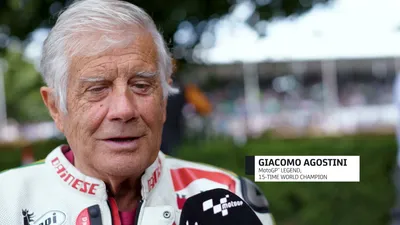
As Giacomo Agostini celebrates more than half a century of influence on the world of motorcycle racing, the legendary Italian rider takes a moment to reflect on his illustrious career, his place in the sport’s history, and his thoughts on the future of MotoGP. With 15 world championships, 68 Grand Prix victories, and a legacy that has shaped the sport in ways few could ever dream of, Agostini’s words still carry weight in the paddock today.
“I’ve heard people speak about me, some say I laid a legacy of excellence, others call me the King of the Track,” Agostini says with a quiet humility. “But I think there is a lot more to it than that. It’s not just about the titles, the wins, or the records. It’s about the passion for the sport, the people you meet, and the challenge you face every single time you race.”
Giacomo Agostini’s career is often regarded as one of the greatest in the history of motorcycle racing. The 82-year-old Italian dominated both the 500cc and 350cc classes throughout the 1960s and 1970s, often with MV Agusta, his team of choice for much of his career. Winning 8 world championships in the 500cc class and 7 in the 350cc class, Agostini’s unparalleled consistency and technical skill set him apart from his rivals.
“It was never just about speed,” Agostini recalls. “It was about understanding the bike, the race, and the road ahead. Every time I raced, I was constantly pushing the boundaries of what was possible. That’s what made it so special.”
For those who watched Agostini race, it was clear that his passion for motorcycling extended far beyond the track. His determination to succeed, his unyielding will, and his work ethic made him not just a rider but a symbol of excellence in motorsport.
While Agostini’s era is now considered “the golden age” of motorcycle racing, the evolution of MotoGP and its technology has continued at a rapid pace. The modern-day sport is faster, more advanced, and more dangerous than ever before, with cutting-edge technology and an influx of young, talented riders.
Agostini has seen it all, from the days when racing was often a battle of survival, to the precision-driven sport it is today. But what does he think about the future of MotoGP?
“I see a lot of incredible talent in the current generation of riders,” Agostini says. “Guys like Marc Márquez, Francesco Bagnaia, and others—they have the skills, the mindset, and the passion to carry the sport forward. But I also think that there’s a lot we can learn from the past.”
“Technology helps, of course, but nothing can replace the raw instinct of a rider. It’s still about mastering the machine and the track,” he says.
Being called “The King of the Track” is no small honor, and Agostini has earned the title many times over, but he remains as grounded as ever when asked about his legacy.
“I don’t look at it that way,” he says. “For me, it was always about the journey, not the title. There were so many great riders in my time, guys like Mike Hailwood, John Surtees, and so many others. We all helped shape the sport in our own way.”
While Agostini retired from competitive racing in the mid-1970s, his influence on the sport has never faded. He’s been involved in various facets of the motorcycling world ever since, from team management to commentary, and continues to inspire new generations of riders with his insights and wisdom.
“I still love the sport as much as I did when I first started,” Agostini admits. “It’s in my blood. Whether I’m at a race or simply watching from home, I feel the same excitement, the same adrenaline that I felt all those years ago. And I hope that the younger generation keeps that passion alive.”
Despite his legendary status, Agostini remains approachable and humble, always willing to share his experiences and mentor the next wave of racers. His legacy continues to be a guiding light for those who are fortunate enough to learn from him.
As the conversation winds down, Agostini offers a final thought that encapsulates his enduring philosophy: “What I hope for, more than anything, is that the spirit of racing stays alive. That it’s not just about the wins and losses, but about pushing yourself to be better, and always striving for excellence.

